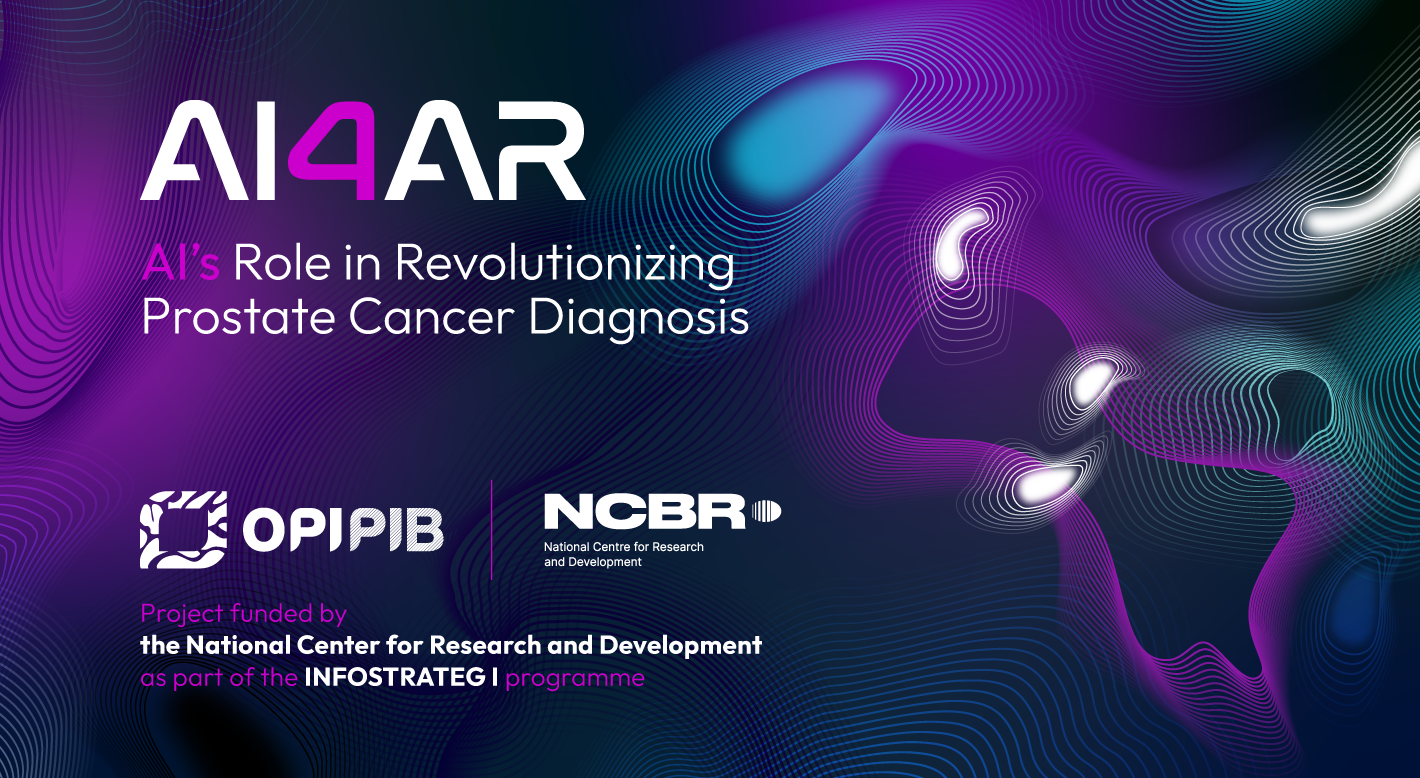Initial trials of the new AI4AR platform at the Lower Silesian Center for Oncology, Pulmonology and Hematology (DCOPiH) have been successful. On 23 June, the platform will be presented in Zabrze at the international ‘Information Technology in Biomedicine’ conference. AI4AR was developed as part of the AI-enhanced radiology – detection, reporting, and clinical decision making in prostate cancer diagnosis project, which was funded under the INFOSTRATEG I National Centre for Research and Development programme.
Artificial intelligence vs. prostate cancer
Prostate cancer has become a growing problem, both from the medical and social perspectives. The diagnostic methods that are becoming popular include medical imaging and, in particular, multi-parametric magnetic resonance imaging (mpMRI). The evaluation of an mpMRI scan is a complex and multi-aspect task, while the quality of reporting of lesions and communication between radiologists and clinicians play key roles in implementing suitable treatment plans. With staff shortages among radiologists and the long training necessary to become an experienced specialist capable of properly evaluating mpMRI results, the use of artificial intelligence is of utmost importance.
‘Contemporary AI-based models assist radiologists in analysing mpMRI scans, enabling precise evaluation of features that are characteristic of various tumours. The effectiveness of these tools largely depends on trustworthy and reliable reference datasets that are used to train AI algorithms. The integration of these technologies significantly enhances diagnostic accuracy and reporting efficiency,’ says Dr Jarosław Protasiewicz, Head of OPI PIB. ‘AI4AR is an innovative tool that combines the advantages of standardisation with the potential of artificial intelligence, offering reliable analyses that support effective clinical decision-making,’ he adds.
Cancer diagnosis supported by artificial intelligence
With AI4AR, advanced technology becomes part of routine clinical practice, significantly improving prostate cancer diagnosis. AI4AR ensures standardized MRI reporting by adhering to the PI-RADS 2.1 standard, enhancing both communication and documentation. Custom-developed AI models support radiologists by segmenting prostate zones and detecting suspicious areas. The platform automatically determines prostate volume and PSA density, two key parameters in cancer diagnostics. AI4AR relies on trusted reference datasets, ensuring more accurate diagnostic results. Reports are automatically generated in compliance with relevant standards, which saves time and minimizes the risk of inaccuracies. Supporting radiologists at all stages, AI4AR optimises workflow efficiency and diagnostic precision. The platform not only improves daily clinical processes but also elevates patient care standards. Artifical intelligence serves as a supportive partner to radiologists, improving workflow without replacing human expertise.
Value-Based Radiology
Value-Based Radiology (VBR) shifts the emphasis from quantity to quality, prioritising the clinical value of scans for patients and the healthcare system. VBR focuses on making radiology more effective, targeted, and responsive to actual patient needs.
‘Artificial intelligence may soon become a key tool in shifting from quantity to quality in radiology. It’s unlikely to replace medical professionals, but it will serve as a valuable aid. AI enhances efficiency, giving healthcare providers more time to focus on what truly matters: their patients. We shouldn’t fear artificial intelligence – we should learn how to use it to our advantage,’ says DrRafał Jóźwiak, Head of the Innovation Centre for Digital Medicine at OPI PIB.
Modern radiology education incorporating AI not only enhances radiologists’ competencies but also becomes a key tool for achieving VBR goals – through improved quality, efficiency, and focus on clinical value for the patient. The OPI PIB platform includes a vital educational module enhanced by artificial intelligence. This component enables numerous simulations, particularly of cases that are the most challenging to diagnose due to their nonspecific or ambiguous nature. With AI, radiologists can access simulations based on real clinical cases. The AI4AR educational module offers a unique opportunity to learn through the interpretation of actual cases, providing practical experience in a radiologist’s working environment, using a DICOM viewer integrated with the structured reporting platform.
AI4AR validated by physicians
The AI4AR platform will be officially launched during the international conference Information Technology in Biomedicine, held on June 23–25 in Zabrze, Poland. Experts from OPI PIB will present the tool to conference participants, allowing them to experience firsthand how it genuinely supports radiologists’ work. As part of ongoing research collaboration, the AI4AR platform has been used at the Lower Silesian Center of Oncology, Pulmonology, and Hematology within the PRAISE-U Poland program – a component of a European initiative validating an adaptive model for prostate cancer screening. The program aims to effectively identify clinically significant cancers while reducing overdiagnosis. Accurate reporting is essential in this process, and the OPI PIB platform significantly improves it. AI4AR’s structured reports provide clinicians with a comprehensive dataset necessary for making therapeutic decisions in partnership with the patient.
‘AI4AR is a web-based platform that supports radiologists in creating structured imaging reports – according to a scheme defined by the radiologist. It is a highly useful tool that helps us make accurate diagnostic decisions faster. It also supports urologists, especially when performing fusion biopsies of the prostate, where they often must interpret MRI images themselves and target suspicious lesions. In the fight against cancer, time and precision matter – and the OPI PIB platform gives us both,’ says Associate Professor Krzysztof Tupikowski, MD, Head of DCOPiH.
The AI4AR platform was developed as part of the project AI-Augmented Radiology – Detection, Reporting, and Clinical Decision-Making in Prostate Cancer Diagnostics, funded by the INFOSTRATEG I program of the National Centre for Research and Development. It was created by experts from the Center for Innovation in Digital Medicine, operating at the National Information Processing Institute – National Research Institute (OPI PIB). The Center is composed of specialists and researchers developing innovative solutions in the field of digital medicine. They emphasize an interdisciplinary approach to research and development, standardization, and high-quality data. The Center supports close collaboration between scientific and medical communities to jointly shape the future of medical technology.
